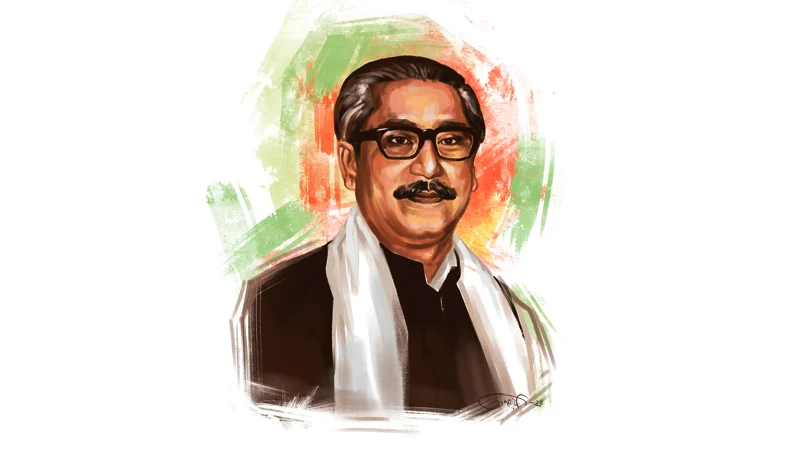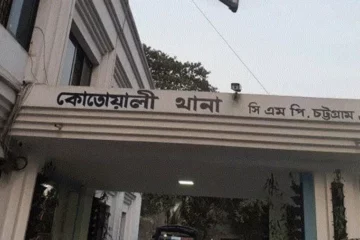Bengal, Bengalis, Bangabandhu and Bangladesh – one and inseparable part. Sheikh Mujib means Bangladesh. Sheikh Mujib is the name of the slogan of the freedom-loving people. Sheikh Mujib is the purest name flowing in the arteries of the consciousness of the Bengali nation. He is eternal-everlasting; Sheikh Mujib is the name of the indestructible consciousness of Bengalis from generation to generation. He is the symbol of the infinite bravery of Bengalis – the greatest hero of all time of the entire Bengali nation.
Today is March 17. It is the 105th birthday of Bangabandhu Sheikh Mujibur Rahman, the architect of independent Bangladesh and the Father of the Nation. He was born on this day in 1920 in a noble Sheikh family in Tungipara, Gopalganj. The nation will also celebrate the birthday of this greatest Bengali of a thousand years as 'National Children's Day'.
The entire nation will remember with deep respect and bowed heads today the great man, whose hand created an immortal story in this land. The man who broke the chains of a thousand years of subjugation and gave Bengalis the identity of a nation. The day will be celebrated with state honors. For this, various programs have been taken up at the government and private levels. There will also be a government holiday.
President Md. Shahabuddin and Prime Minister Sheikh Hasina have issued separate messages on the occasion of the Father of the Nation's birthday and National Children's Day. In the messages, they paid deep respect to the memory of the Father of the Nation and called on the countrymen to work unitedly to build the Golden Bangla of his dream.
Bangabandhu Sheikh Mujibur Rahman, the undisputed leader of Bengal, got involved in politics during his school days. He was imprisoned for the first time for joining the anti-British movement while he was a student of the eighth grade of Gopalganj Mission School in his teens. He joined the All India Muslim Students Federation in 1940. After passing his matriculation, while studying at Calcutta Islamia College (now Maulana Azad College), he came in contact with the leading political leaders of the time, including Hossain Shaheed Suhrawardy and Sher-e-Bangla AK Fazlul Haque. In 1946, he was elected the general secretary of the Calcutta Islamia College Students Union. From that time on, he established himself in the arena of politics as a student and youth leader.
After independence from British rule in 1947, he returned to Dhaka and moved forward with new political ideas. He formed the Chhatra League with his colleagues in 1948. When the first opposition party in Pakistan, the Awami Muslim League, was formed on June 23, 1949, against the then ruling Muslim League, the young leader Sheikh Mujib was appointed the joint secretary of the party. In 1953, he was elected the general secretary of the party. In 1956, the word 'Muslim' was dropped from the Awami Muslim League in a non-communal spirit and the party was renamed 'Awami League'.
Bangabandhu played an important role in all the movements and struggles against the Pakistani military regime, including the language movement of 1950, the movement against Ayub Khan's military rule of 1962, and the education movement of 1962. He had to go to jail repeatedly because of these movements to achieve the rights of Bengalis.
In 1954, he was elected as a member of the East Bengal Legislative Assembly on the nomination of the United Front. In the same year, he was included in the cabinet of the United Front government. As the head of the Awami League, Bangabandhu announced the historic six-point charter of autonomy for the then East Pakistan, i.e. the charter of liberation for the Bengalis, on February 5, 1966, in Lahore. The dictator of Pakistan, General Ayub Khan, filed a case of Agartala conspiracy against Bangabandhu and other leading figures and sent them to jail. Through the historic mass uprising of 1969, the Bengalis released Sheikh Mujib from prison and honored him with the title of 'Bangabandhu'.
In the 1970 elections, the Bengalis gave their unwavering support to Bangabandhu's six-point manifesto. The Awami League won the mandate of the majority political party in Pakistan; but the Pakistani ruling group did not accept this electoral victory of the Bengalis under the leadership of Bangabandhu. Then, Bangabandhu transformed the movement for autonomy through various ups and downs, first into a movement for independence and finally into a movement for independence.
In continuation of this movement and struggle, Bangabandhu started an unprecedented non-cooperation movement in March 1971. On March 7, in a historic speech to the crowd at the then Race Course Maidan (now Suhrawardy Udyan), he thunderously declared, 'This time's struggle is our struggle for freedom; this time's struggle is our struggle for independence.' In this speech, he called for independence and gave the united Bengali nation the direction of the struggle for independence.
On the night of March 25, 1971, when the Pakistani military began attacking unarmed Bengalis, Bangabandhu declared independence over wireless from his residence on Road No. 32, Dhanmondi in the early hours of March 26. After that, Bangabandhu was arrested from his residence and taken to a West Pakistan jail. In exchange for the sacrifice of 3 million martyrs and the loss of honor of 200,000 mothers and sisters in the 9-month armed liberation war, the brave Bengalis snatched victory on December 16, 1971. Independent and sovereign Bangladesh emerged on the world map.
Bangabandhu returned to his homeland after being released from a Pakistani prison on January 10, 1972. He dedicated himself to the reconstruction and rehabilitation of the newly independent country. In 1975, he announced a national program for the economic liberation of the nation. Shortly after, he and his family were killed by power-hungry assassins at his residence on the night of August 15. Just three and a half years after achieving independence, the great hero of independence, Bangabandhu, passed away. The death sentence of five of the accused sentenced to death in the murder case of the Father of the Nation, Bangabandhu Sheikh Mujibur Rahman, was executed in Dhaka Central Jail on January 28, 2010. This marked the end of a dark era in the nation's history.
He is appreciated all over the world for his unforgettable role in establishing freedom, democracy, equality and world peace. He was awarded the 'Julio Curie' medal for his outstanding contribution in these fields. In addition, Bangabandhu was selected as the greatest Bengali of all time in a BBC survey.
Program of the day
As part of the state program, President Md. Shahabuddin and Prime Minister Sheikh Hasina will pay floral tributes at Bangabandhu's tomb in Tungipara at 10:30 am today, Sunday. After standing in silence for some time, they will recite Fateha and participate in special prayers. A well-equipped contingent of the three forces will provide a guard of honor; bugles will be played. Later, the Prime Minister will join a children's and teenagers' rally in Tungipara.
Highlighting the significance of the day, special programs will be broadcast on various private TV channels including Bangladesh Television and Betar, and special supplements and articles will be published in newspapers. Qurankhani, munajat, milad and doa mahfil will be held at various mosques including Baitul Mukarram National Mosque, and special prayer meetings will be held at various temples, churches, pagodas and other religious places of worship including Dhakeshwari National Temple.
The two-day program of the Awami League includes hoisting of the national and party flags at all offices across the country including the Awami League central office at 6:30 am today, a portrait of the Father of the Nation at the Dhanmondi Bangabandhu Bhaban premises at 7 am and paying homage at his tomb in Tungipara at 10:30 am, Milad and Doa Mahfil and a discussion meeting at the Dhaka District Awami League Bhaban in Tejgaon in the capital at 11 am tomorrow, Monday. The meeting, chaired by Prime Minister and Awami League President Sheikh Hasina, will be addressed by the party's central leaders.






